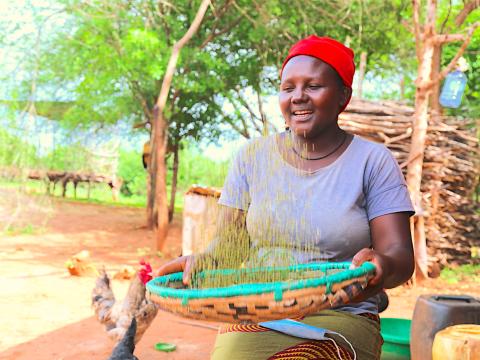Drought resistant seed varieties boost food production and make communities resilient to climate change

By Martin Muluka, Emergency Communications Specialist, World Vision Kenya
It is a busy time at Regina’s farm as she harvests, winnows and packs grains that are ready for the market. She wipes the sweat trickling down her brow with a smile that has been missing in her life for a long time. Just as many families in Kenya’s Kitui County, the past two years have been difficult for Regina and her children.
Kitui is among the 23 Arid and Semi-Arid Land (ASAL) counties that have borne the brunt of climate change in Kenya.The prolonged drought in the area, worsened by climate change, has resulted in human suffering. This has limited access to food and safe water for many families.
The already bad situation was further compounded by the desert locust invasion which destroyed crops in 2020, as well the economic hardships caused by the COVID-19 pandemic.
To tackle the food insecurity challenges, World Vision in partnership with the Kitui County Government and ABSA Kenya organised a capacity building workshop for selected farmers in the Lower Yatta area of Kitui.
The training sessions focused on good agronomic practices, establishing agricultural enterprises and identifying the right type of seeds to use for crop production. Afterwards, farmers were given drought resistant maize and green gram (mung bean) seeds.
Such seeds play a key role in increasing the resilience of communities to the adverse effects of climate change - like droughts or long dry spells - caused by insufficient rainfall. However, a majority of rural farmers who are worst hit by perennial droughts, usually lack information on these ideal seed varieties or finances for purchasing them.

For instance, most of the farmers in Lower Yatta used to plant green gram seeds that yield 200 kilogrammes per hectare and take a maximum of 90 days (3 months) to mature.
Yet, scientists from the Kenya Agricultural Research and Livestock Organisation (KARLO) have developed improved green gram seeds (branded Katumani mung bean 26) with potential yields of 1,500 kilogrammes per hectare, which take a maximum of 60 days (2 months) to mature.
“These new seed varieties are ideal for communities in dry areas and that is why we chose to give them to farmers after their training. In the past, many people suffered huge crop losses as the old green gram seeds they had would dry in the field before maturity due to short rains,” notes Diana, a World Vision Food Security Specialist in Yatta, Kitui.
She adds, “Once you get these seeds, that’s it. You do not need to keep purchasing them each planting season. All farmers need to do is to select some of the best green grams from their harvest and preserve them as seeds for the next planting season. The rest of the produce is used for home consumption and also sold for income generation.”
In Lower Yatta, where the project was piloted, farmers in the entire area have now embraced the new seeds, as well as modern farming practices.
“Life for me used to be difficult especially in 2020 when COVID-19 struck. There was no food because of a prolonged drought. World Vision trained us on modern farming methods and then gave us seeds to plant. I followed the training and harvested a lot of green grams. Apart from providing food for my family, the harvest has provided an income that is helping me to sustain my family. My life is much better now,” says Regina, who is enjoying her second harvest from the improved green gram seed variety.
“I like the new variety because it is not easily attacked by pests and also requires no fertilizer. The yields are getting better and better,” she adds.
According to the Kitui County Government, World Vision remains an important partner in efforts aimed at strengthening food security the area. Thanks to the training and seed donation given to communities by World Vision and Absa, farmers now harvest green grams totalling to 49,000,000 kilogrammes after the short rain seasons annually.
These food security initiatives are slowly turning tides in Kitui County. Once considered a perpetual food aid dependent county, Kitui is slowly turning into a food producer and supplier in Kenya